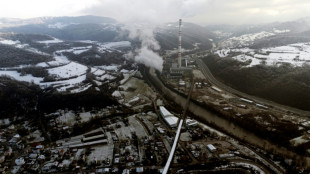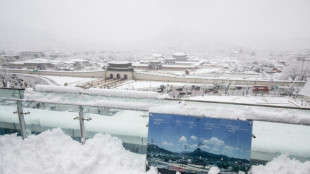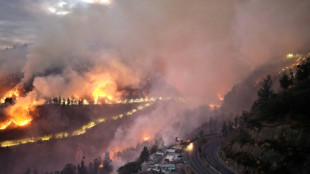
-
 French govt ready for budget concessions to avoid financial 'storm'
French govt ready for budget concessions to avoid financial 'storm'
-
Hong Kong airport third runway takes off

-
 In Bosnia, the path to renewables runs through its coal mines
In Bosnia, the path to renewables runs through its coal mines
-
China probes top military official for corruption

-
 Syria war monitor says more than 130 dead in army-jihadist clashes
Syria war monitor says more than 130 dead in army-jihadist clashes
-
China says top military official Miao Hua under investigation

-
 Taiwan president's plan to stop over in Hawaii, Guam angers Beijing
Taiwan president's plan to stop over in Hawaii, Guam angers Beijing
-
Russian attacks leave one million Ukrainians without power

-
 Markets mixed after subdued pre-holiday shift on Wall St
Markets mixed after subdued pre-holiday shift on Wall St
-
What would an ICC arrest warrant for Myanmar's junta chief mean?

-
 China says top military official Miao Hua suspended, under investigation
China says top military official Miao Hua suspended, under investigation
-
Taiwan's Lai to stop over in Hawaii, Guam during Pacific trip

-
 Namibia extends voting after logistical issues
Namibia extends voting after logistical issues
-
LIV Golf's Herbert in charge at Australian Open, Smith two back

-
 Despair in Sweden as gangs recruit kids as contract killers
Despair in Sweden as gangs recruit kids as contract killers
-
Russia launches massive aerial attack on Ukraine's energy sector

-
 Peru scientists unveil crocodile fossil up to 12 million years old
Peru scientists unveil crocodile fossil up to 12 million years old
-
At plastic treaty talks, no united front for industry

-
 Williamson falls for 93 as England fight back in first Test
Williamson falls for 93 as England fight back in first Test
-
South Korea officials say three dead in heavy snowfall

-
 High-flying Fiorentina face test of Scudetto credentials with Inter visit
High-flying Fiorentina face test of Scudetto credentials with Inter visit
-
Verstappen switches focus to re-boot defence of F1 teams' title

-
 UK filmmaker Richard Curtis makes first foray into animation
UK filmmaker Richard Curtis makes first foray into animation
-
Countrywide air alert in Ukraine due to missile threat

-
 China's military corruption crackdown explained
China's military corruption crackdown explained
-
Primark boss defends practices as budget fashion brand eyes expansion

-
 Williamson eyes ton as New Zealand take control against England
Williamson eyes ton as New Zealand take control against England
-
Norway faces WWF in court over deep sea mining

-
 Trump, Sheinbaum discuss migration in Mexico amid tariff threat
Trump, Sheinbaum discuss migration in Mexico amid tariff threat
-
Asian markets mixed after subdued pre-holiday shift on Wall St

-
 Orban's soft power shines as Hungary hosts Israeli match
Orban's soft power shines as Hungary hosts Israeli match
-
'Retaliate': Trump tariff talk spurs global jitters, preparations

-
 'Anti-woke' Americans hail death of DEI as another domino topples
'Anti-woke' Americans hail death of DEI as another domino topples
-
Trump hails migration talks with Mexico president

-
 Truckers strike accusing Wagner of driver death in Central African Republic
Truckers strike accusing Wagner of driver death in Central African Republic
-
London police say 90 victims identified in new Al-Fayed probe

-
 Air pollution from fires linked to 1.5 million deaths a year
Air pollution from fires linked to 1.5 million deaths a year
-
Latham falls for 47 as New Zealand 104-2 in first England Test

-
 US tells Ukraine to lower conscription age to 18
US tells Ukraine to lower conscription age to 18
-
Judge denies Sean Combs bail: court order

-
 Suarez extends Inter Miami stay with new deal
Suarez extends Inter Miami stay with new deal
-
Perfect Liverpool on top of Champions League, Dortmund also among winners

-
 Liverpool more 'up for it' than beaten Madrid, concedes Bellingham
Liverpool more 'up for it' than beaten Madrid, concedes Bellingham
-
Aston Villa denied late winner against Juventus

-
 Mexico president hails 'excellent' Trump talks after US tariff threat
Mexico president hails 'excellent' Trump talks after US tariff threat
-
Leicester set to appoint Van Nistelrooy - reports

-
 Coffee price heats up on tight Brazil crop fears
Coffee price heats up on tight Brazil crop fears
-
Maeda salvages Celtic draw against Club Brugge

-
 Villa denied late winner against Juventus
Villa denied late winner against Juventus
-
Dortmund beat Zagreb to climb into Champions League top four


Cuban blackout highlights urgency of boosting renewables: experts
The massive blackout that plunged Cuba into darkness for four days highlighted the communist island's failure to end its near-total dependance on ageing oil-fired power plants by transitioning to renewables, experts say.
A decade after the Cuban government said it aimed to produce 24 percent of its electricity from renewables by 2030 and in so doing reduce its dependence on oil imports it can ill-afford, the Caribbean island has made little progress.
In 2022, Cuba got only 5 percent of its electricity from natural sources, the Environmental Defense Fund, a US-based NGO, noted in a recent report, a small increase from 2014, when renewables provided 4.3 percent of its power.
Analysts cite the nation's crumbling grid as one of the factors impeding Havana's progress on the renewables front, along with Cuba's ongoing economic crisis, the worst the country's faced since the fall of the Soviet Union -- Cuba's chief ally and financial backer -- in the early 1990s.
Cuban economist Pedro Monreal also blamed the country's energy crisis on chronic underinvestment in energy infrastructure compared with what he called "excessive" spending on "little-used" tourism facilities.
Between 2020 and June 2024, tourism accounted for 38.9 percent of government spending, compared with only 9.4 percent on electricity, gas and water, he wrote on the social network X.
With several of the island's power plants dating back over 40 years, breakdowns have become more frequent.
A drop in the supply of cheap oil from leftist ally Venezuela, which is in the throes of its own severe economic crisis, has further aggravated the situation, leaving Cuba struggling to supply fuel to power its plants.
The result has been months of blackouts lasting up to 20 hours per day, culminating in a nationwide blackout on October 18 after the failure of the country's biggest power plant, Antonio Guiteras, which in turn crashed the national grid.
- 'Very precarious situation' -
In 2022, 48 percent of the fuel used in several floating power plants rented from Turkey as well as in the country's vast network of generators was imported, according to EDF.
In the past, much of the oil came from Venezuela, but with Venezuela's own economy in tatters, Caracas "actually started moving it to China because they had to pay off a lot of the debt that they owed to that country," Glen Sartain, general manager of West Monroe, a US-based energy consultancy, told AFP.
"Moving those crude oil resources to different countries really has put Cuba in a very precarious position with regard to the electricity," he added.
The Cuban government blames former US president Donald Trump's ramping up of a US embargo in force since 1962 for worsening the energy crisis.
"The main cause is our failure to access international financial markets for fuel," Energy Minister Vicente de la O Levy said.
The government, which is facing growing social discontent over the power outages, is in talks with Vietnam, China and the European Union about boosting renewable energy, according to several sources close to the issue.
In May, President Miguel Diaz-Canel said the country had signed agreements with unnamed parties "that will allow us to reach more than 2,000 megawatts in under two years" from renewables -- equivalent to the peak supply announced by the authorities for October 28.
- Sun and sugarcane -
So far, Cuba's timid renewables push has centred mainly on solar power and biomass.
Nearly a million Chinese solar panels have been installed across the island of 11 million people, with another 3.6 million planned over the next two years, according to government figures.
"Cuba has abundant renewable sources," Rosell Guerra Campana, director of renewables in the energy ministry, argued in late 2023, citing, "the sun, agricultural and forest biomass."
The island had made significant progress in transforming sugar cane - the country's most iconic export -- into bioethanol, Sartain said.
In contrast, building wind farms and installing solar panels is "very expensive" for the cash-strapped island, he noted.
For EDF, solving Cuba's energy challenges "will not be no small task" as it will require "substantial investments of capital, which have been hard to come by given real and perceived risks of investing in Cuba."
H.Seidel--BTB
